人教版八年级英语上册第一单元语法知识点归纳完整版
新人教版八年级上册英语Unit1重点知识归纳
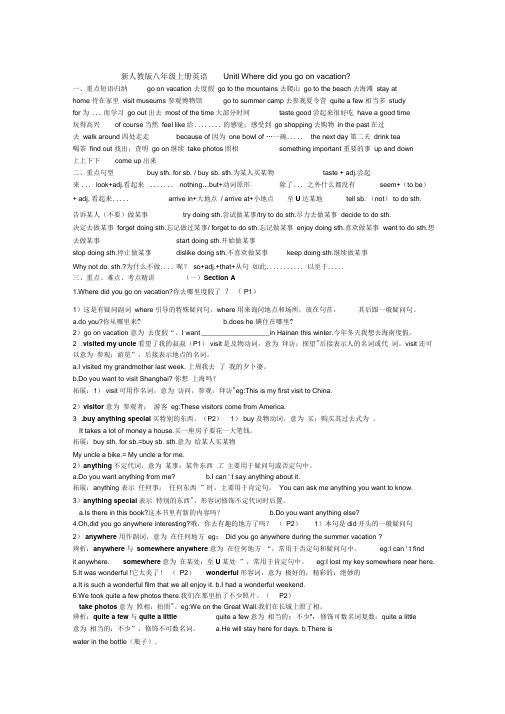
新人教版八年级上册英语Unitl Where did you go on vacation?一、重点短语归纳go on vacation 去度假go to the mountains 去爬山go to the beach去海滩stay athome 待在家里visit museums 参观博物馆go to summer camp去参观夏令营quite a few 相当多studyfor为 ... 而学习go out出去most of the time大部分时间taste good尝起来很好吃have a good time玩得高兴of course当然feel like给........ 的感觉;感受到go shopping去购物in the past在过去walk around 四处走走because of 因为one bowl of …一碗..... the next day 第二天drink tea喝茶find out 找出;查明go on继续take photos照相something important 重要的事up and down上上下下come up出来二、重点句型buy sth. for sb. / buy sb. sth.为某人买某物taste + adj.尝起来... look+adj.看起来 ....... nothing…but+动词原形除了... 之外什么都没有seem+(to be)+ adj. 看起来..... arrive in+大地点/ arrive at+小地点至U达某地tell sb. (not) to do sth.告诉某人(不要)做某事try doing sth.尝试做某事/try to do sth.尽力去做某事decide to do sth.决定去做某事forget doing sth.忘记做过某事/ forget to do sth.忘记做某事enjoy doing sth.喜欢做某事want to do sth.想去做某事start doing sth.开始做某事stop doing sth.停止做某事dislike doing sth.不喜欢做某事keep doing sth.继续做某事Why not do. sth.?为什么不做.... 呢?so+adj.+that+从句如此........... 以至于.....三、重点、难点、考点精讲(一)Section A1.Where did you go on vacation?你去哪里度假了?( P1)1)这是有疑问副词where引导的特殊疑问句,where用来询问地点和场所,放在句首,其后跟一般疑问句。
人教版八年级英语上册第一单元知识点归纳
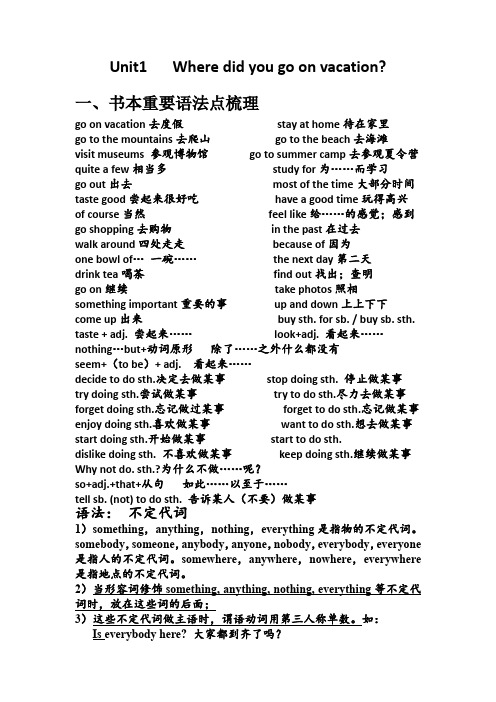
Unit1 Where did you go on vacation?一、书本重要语法点梳理go on vacation去度假stay at home待在家里go to the mountains去爬山go to the beach去海滩visit museums 参观博物馆go to summer camp去参观夏令营quite a few相当多study for为……而学习go out出去most of the time大部分时间taste good尝起来很好吃have a good time玩得高兴of course当然feel like给……的感觉;感到go shopping去购物in the past在过去walk around四处走走because of因为one bowl of…一碗……the next day第二天drink tea喝茶find out找出;查明go on继续take photos照相something important重要的事up and down上上下下come up出来buy sth. for sb. / buy sb. sth. taste + adj. 尝起来……look+adj. 看起来……nothing…but+动词原形除了……之外什么都没有seem+(to be)+ adj. 看起来……decide to do sth.决定去做某事stop doing sth. 停止做某事try doing sth.尝试做某事try to do sth.尽力去做某事forget doing sth.忘记做过某事forget to do sth.忘记做某事enjoy doing sth.喜欢做某事want to do sth.想去做某事start doing sth.开始做某事start to do sth.dislike doing sth. 不喜欢做某事keep doing sth.继续做某事Why not do. sth.?为什么不做……呢?so+adj.+that+从句如此……以至于……tell sb. (not) to do sth. 告诉某人(不要)做某事语法:不定代词1)something,anything,nothing,everything是指物的不定代词。
人教版八年级英语核心语法考点归纳

人教版八年级英语核心语法考点归纳八年级上册Unit 1考点一:复合不定代词复合不定代词由some, any, no, every 与one, body, thing 构成。
在使用复合不定代词时应注意以下几点:1. some- 一般用于肯定句中,any- 一般用于否定句或疑问句中,在表示请求、建议或期望得到肯定回答时,常用some- 构成的复合不定代词;2. 复合不定代词作主语时按单数看待;3. 形容词或else 修饰复合不定代词的时候应后置。
考点二:一般过去时定义:一般过去时表示过去某个时间发生的动作或存在的状态,也可表示过去经常发生的习惯性的动作或行为。
结构:主语+ 动词过去式+ 其他;主语+was / were + 其他。
常用时见壮语:yesterday, two years ago, last week, just now 等。
1.The old man _____ in Shanghai, but he _____ in Haikou now.A.be born; liveB.was born ; liveC.is born; livesD.was born; lives2. —Where were you last Saturday?—I ____ in the Capital Museum.A. amB. will beC. wasD. have been八年级上册Unit 2考点一:拼读副词频度副词表示动作或行为发生的频率。
常见的频度副词及其发生的频率如下表:考点二:how 疑问词组练一练3.()do you usually go to school,Simon? -by bike.A.WhenB.HowC.WhatD.Where(答案在文末获取)八年级上册Unit 3考点一:形容词和副词的比较级形容词和副词的比较能表示两者之间的比较关系,表示A 比B 更……,通常用than 来连接。
人教版八年级英语上册第一单元语法知识点归纳

人教版八年级英语上册第一单元语法知识点归纳Unit 1一、词组、短语:1、go XXX去度假,2、stay at home呆在家,3、go to the mountains上山/进山,4、go to the XXX到海边去,5、visit museums参观博物馆,6、go to summer camp去夏令营,7、quite a few相当多,8、XXX为……研究,9、go out出去,10、most of the time大部分时间/绝大多数时间,11、taste good尝起来味道好,12、have a good time玩的开心,13、of course当然可以,14、XXX感觉像……/想要,15、go shopping购物,16、in the past在过去,17、walk around绕……走,18、too many太多(可数名词前面),19、because of因为,20、one bowl of一碗……,21、find out查出来/发觉,22、go on继续,23、take photos拍照,24、XXX紧张的事情,25、up and down上高低下,26、come up出来二、惯用法、搭配1. buy sth. for ab./ buy sb. sth.为或人买某物2. taste + adj.尝起来……3. nothing….but + V.(真相)除……之外甚么都没有4. seem + (to be) + adj看起来5. XXX小地方到达某地6. XXX do XXX决定做某事7. XXX.尝试做某事/ try to do sth.尽力做某事8. XXX喜爱做某事9. want to do sth.想去做某事10. XXX.入手下手做某事11. stop XXX截止做某事12. look + adj看起来13. XXX XXX.不喜欢做某事14. Why not do sth.为什么不做…….呢?15. so + adj + that +从句云云……以致于……16. tell sb. (not) to do sth.告诉或人(不要)做某事17. keep XXX继续做某事18. forget to do XXX.忘记去做某事XXX忘记做过某事三、重点句子1. Where did you go on vacation?你去哪儿度假的?1)这是一个由疑问副词where引导的特殊疑问句。
(完整版)八年级上册第一单元英语语法、短语和知识点总结

八年级上册英语语法、短语和知识点总结Unit 1 Where did you go on vacati on?本单元的话题:谈论假期活动内容,复习一般过去时。
本单元的语法:1.复习一般过去时;2•学习不定代词和不定副词的用法。
语法: 1•本单元出现的动词不规则过去式有:is\am---was 是;are -- were 是;go---went 去;buy —bought买;take ---took拿走;do\does —did 做;feed—fed喂;see —saw看见;eat --ate 吃;have\has —had 有、吃;feel -felt 感觉;ride —rode 骑;get --got 到达,得到;can — could 能、会;forget —forgot 忘记;drink —drank 喝;find —found 找到2. 不定代词和不定副词的用法:some bodyany oneevery thingno where (疑问副词)不定代词和不定副词(1)左边的some、any、every、no 与右边的body、one、thing 构成不定代词,some、any、every、no与右边的疑问副词where 构成不定副词;(2)—般情况下以some开头的不定代词和不定副词用于肯定句,以any开头的不定代词和不定副词用于否定句、疑问句;以no开头的不定代词和不定副词表示否定含义(no one为两个单词);(3)不定代词或不定副词和形容词连用时,形容词放在后面。
He has something important to do. 他有重要的事情要做。
(肯定句用something,形容词important 放后)Did you buy anything special?(一般疑问句用anything,形容词special放后)Did you go any where interesting last mon th? 上个月你去令人感兴趣的地方了吗?(一般疑问句用不定副词anywhere,形容词interesting 放后)(4)不定代词和不定副词做主语时,后面的动词用单数形式。
人教版英语八年级上册unit 1

人教版英语八年级上册unit 1一、重点单词。
1. anyone.- 词性:不定代词,意为“任何人”,用于否定句和疑问句中。
例如:Did you meet anyone interesting at the party?(你在聚会上遇到有趣的人了吗?)2. anywhere?- 词性:副词,意为“在任何地方;无论何处”。
例如:I can't find my keys anywhere.(我到处都找不到我的钥匙。
)3. wonderful.- 词性:形容词,意为“精彩的;绝妙的”。
例如:We had a wonderful timeat the concert.(我们在音乐会上度过了一段美妙的时光。
)4. few.- 词性:形容词,意为“不多;很少”,修饰可数名词复数,表示否定意义。
例如:There are few apples on the tree.(树上几乎没有苹果了。
)- 区别:a few表示“一些;几个”,表示肯定意义。
例如:There are a few students in the classroom.(教室里有几个学生。
)5. most.- 词性:形容词,意为“最多的;大多数的”。
例如:Most students like English.(大多数学生喜欢英语。
)- 也可作副词,意为“最;非常”。
例如:This is the most beautiful flower.(这是最漂亮的花。
)6. something.- 词性:不定代词,意为“某事;某物”,用于肯定句中。
例如:I have something important to tell you.(我有重要的事情要告诉你。
)7. nothing.- 词性:不定代词,意为“没有什么;没有一件东西”。
例如:There is nothing in the box.(盒子里什么都没有。
)8. everyone.- 词性:不定代词,意为“每人;人人;所有人”。
最全面新人教版八年级上册英语单元语法及知识点归纳汇总(精华版)

新人教版八年级上册英语单元语法及知识点归纳Unit1 Where did you go on vacation?【重点语法】不定代词:不指名代替任何特定名词或形容词的代词叫做不定代词。
用法注意:1. some 和any +可数名/不可数名。
some 多用于肯定句,any多用于否定句、疑问句和条件从句。
有些问句中用some,不用any, 问话者希望得到对方肯定回答。
2. 由some, any, no, every 与body, one, thing构成的复合不定代词作主语时,其谓语动词用三单。
3. 不定代词若有定语修饰,该定语要置于其后:如:something interesting【重点短语】1. buy sth for ab./ buy sb. sth 为某人买某物2. taste + adj. 尝起来……3. nothing...but + V.(原形) 除了……之外什么都没有4. seem + (to be) + adj 看起来5. arrive in + 大地方/ arrive at + 小地方到达某地6. decide to do sth. 决定做某事7. try doing sth. 尝试做某事/ try to do sth. 尽力做某事8. enjoy doing sth. 喜欢做某事9. want to do sth. 想去做某事10. start doing sth. 开始做某事=begin doing sth.11. stop doing sth. 停止做某事区分:stop to do sth. 停下来去做某事12. dislike doing sth. 不喜欢做某事14. so + adj + that + 从句如此……以至于……16. tell sb. (not) to do sth. 告诉某人(不要)做某事17. keep doing sth. 继续做某事18. forget to do sth. 忘记去做某事/ forget doing sth 忘记做过某事【词语辨析】1. take a photo/ take photos 拍照quite a few+名词复数“许多…”2. seem + 形容词看起来…... You seem happy today.seem + to do sth. 似乎/好像做某事I seem to have a coldIt seems + 从句似乎..…. It seems that no one believe you.seem like ... 好像,似乎….. It seems like a good idea.3. arrive in +大地点= get to= reach+地点名“到达......”arrive at +小地点(注:若后跟地点副词here/there/home, 介词需省略,如:arrive here; get home)4. feel like sth 感觉像…feel doing sth. 想要做某事5. wonder(想知道)+疑问词(who, what, why)引导的从句。
人教版八年级上册英语第一单元语法知识点总结
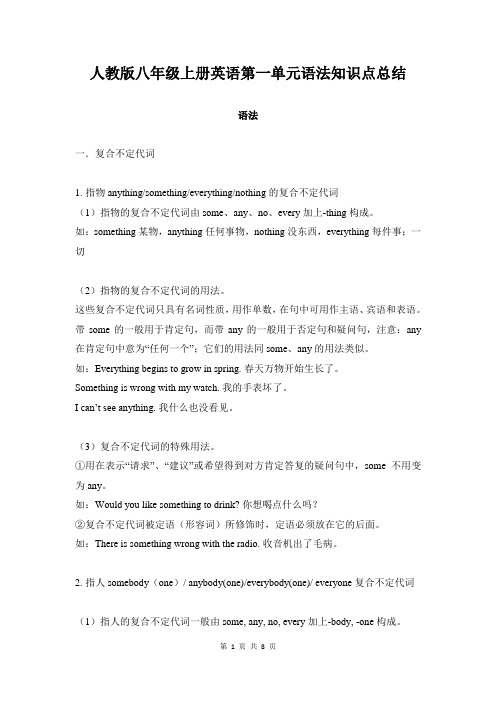
人教版八年级上册英语第一单元语法知识点总结语法一.复合不定代词1.指物anything/something/everything/nothing的复合不定代词(1)指物的复合不定代词由some、any、no、every加上-thing构成。
如:something某物,anything任何事物,nothing没东西,everything每件事;一切(2)指物的复合不定代词的用法。
这些复合不定代词只具有名词性质,用作单数,在句中可用作主语、宾语和表语。
带some的一般用于肯定句,而带any的一般用于否定句和疑问句,注意:any 在肯定句中意为“任何一个”;它们的用法同some、any的用法类似。
如:Everything begins to grow in spring. 春天万物开始生长了。
Something is wrong with my watch. 我的手表坏了。
I can’t see anything.我什么也没看见。
(3)复合不定代词的特殊用法。
①用在表示“请求”、“建议”或希望得到对方肯定答复的疑问句中,some不用变为any。
如:Would you like something to drink? 你想喝点什么吗?②复合不定代词被定语(形容词)所修饰时,定语必须放在它的后面。
如:There is something wrong with the radio. 收音机出了毛病。
2.指人somebody(one)/ anybody(one)/everybody(one)/ everyone复合不定代词(1)指人的复合不定代词一般由some, any, no, every加上-body, -one构成。
如:somebody某人,anybody任何人,nobody没人,everybody每人someone某人,anyone任何人, no one没人,everyone每人(2)指人的复合不定代词的用法。
最全面人教版八年级上册英语第一单元知识点归纳总结
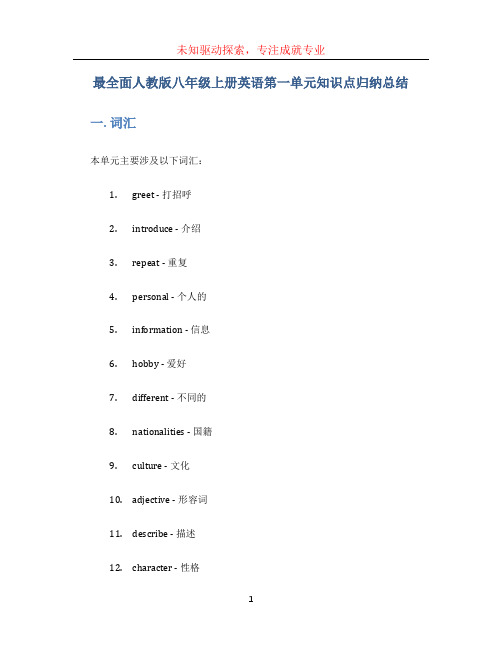
最全面人教版八年级上册英语第一单元知识点归纳总结一. 词汇本单元主要涉及以下词汇:1.greet - 打招呼2.introduce - 介绍3.repeat - 重复4.personal - 个人的rmation - 信息6.hobby - 爱好7.different - 不同的8.nationalities - 国籍9.culture - 文化10.adjective - 形容词11.describe - 描述12.character - 性格二. 语法本单元的语法重点包括:1.be动词(am, is, are)–表示个人特征和国籍,e.g. I am from China.–表示人称和单复数,e.g. We are students.2.人称代词–主格:I, you, he, she, it, we, they–宾格:me, you, him, her, it, us, them3.物主代词–形容词性:my, your, his, her, its, our, their–名词性:mine, yours, his, hers, its, ours, theirs4.形容词的比较级和最高级–比较级:形容词+er,e.g. happier–最高级:the+形容词+est,e.g. the happiest5.数词的基数词和序数词–基数词:one, two, three…–序数词:first, second, third…三. 句型本单元的常用句型有:1.问候语–How do you do?–Nice to meet you.–Good morning/afternoon/evening.2.自我介绍–My name is [name]. I am [age] years old. I am from [country].3.描述个人特征–I am [adjective].–He/She is [adjective].–They are [adjective].4.提问对方的个人信息–What’s your name?–How old are you?–Where are you from?四. 对话本单元的对话主要涉及以下场景:1.两人相互介绍个人信息2.询问对方的国籍和爱好3.描述自己和他人的外貌和性格特征4.向他人提问个人信息并进行回答五. 拓展练习为了加深对本单元知识点的理解和应用,推荐进行以下练习:1.编写自我介绍,包括姓名、年龄、国籍、爱好等。
完整版)人教版八年级英语上册第一单元知识点总结

完整版)人教版八年级英语上册第一单元知识点总结Grade: 8th student name: Tutoring subject: English Teaching teacher: Teacher ShaoTopic: Unit 1 Where did you go on n?Type of class: Preview class。
synchronous class。
review class。
exercise classKey points:1.Mastering key phrases2.Understanding the usage of indefinite pronouns3.Analyzing words and phrasesTeaching content:1.Important grammar pointsUnit 1 Where did you go on n。
go on nstay at homego to the mountainsgo to the beachvisit museumsquite a fewstudy formost of the timetaste goodhave a good timefeel likego shoppingwalk aroundbecause ofone bowl ofthe next dayfind outgo ontake photossomething importantup and downcome upbuy sth。
for sb。
/ buy sb。
sth。
taste + adj。
look + adj。
nothing but + verbseem + (to be) + adj。
arrive in + big place / arrive at + small place decide to do sth。
try doing sth。
八年级上册英语单元语法及知识点归纳
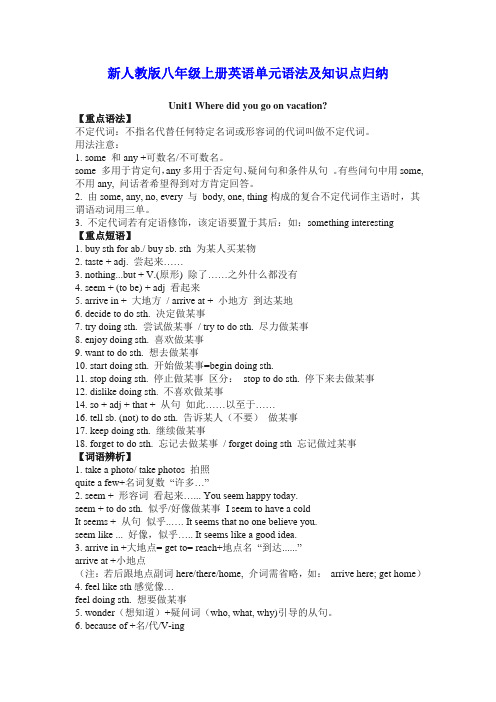
新人教版八年级上册英语单元语法及知识点归纳Unit1 Where did you go on vacation?【重点语法】不定代词:不指名代替任何特定名词或形容词的代词叫做不定代词。
用法注意:1. some 和any +可数名/不可数名。
some 多用于肯定句,any多用于否定句、疑问句和条件从句。
有些问句中用some,不用any, 问话者希望得到对方肯定回答。
2. 由some, any, no, every 与body, one, thing构成的复合不定代词作主语时,其谓语动词用三单。
3. 不定代词若有定语修饰,该定语要置于其后:如:something interesting【重点短语】1. buy sth for ab./ buy sb. sth 为某人买某物2. taste + adj. 尝起来……3. nothing...but + V.(原形) 除了……之外什么都没有4. seem + (to be) + adj 看起来5. arrive in + 大地方/ arrive at + 小地方到达某地6. decide to do sth. 决定做某事7. try doing sth. 尝试做某事/ try to do sth. 尽力做某事8. enjoy doing sth. 喜欢做某事9. want to do sth. 想去做某事10. start doing sth. 开始做某事=begin doing sth.11. stop doing sth. 停止做某事区分:stop to do sth. 停下来去做某事12. dislike doing sth. 不喜欢做某事14. so + adj + that + 从句如此……以至于……16. tell sb. (not) to do sth. 告诉某人(不要)做某事17. keep doing sth. 继续做某事18. forget to do sth. 忘记去做某事/ forget doing sth 忘记做过某事【词语辨析】1. take a photo/ take photos 拍照quite a few+名词复数“许多…”2. seem + 形容词看起来…... You seem happy today.seem + to do sth. 似乎/好像做某事I seem to have a coldIt seems + 从句似乎..…. It seems that no one believe you.seem like ... 好像,似乎….. It seems like a good idea.3. arrive in +大地点= get to= reach+地点名“到达......”arrive at +小地点(注:若后跟地点副词here/there/home, 介词需省略,如:arrive here; get home)4. feel like sth 感觉像…feel doing sth. 想要做某事5. wonder(想知道)+疑问词(who, what, why)引导的从句。
人教版八年级上册英语Unit 1 知识点语法归纳总结

Unit 1 Where did you go on vacation?1.短语归纳2.典句必背3.用法集萃(1)—Where did you go on vacation? 你去哪里度假了?—I went to the mountains. 我去爬山了。
❖Where did you...? 是一般过去时的特殊疑问句,其句式结构为:疑问词+did+主语+动词原形+其他成分?其中did是助动词,没有人称和数的变化,实义动词要用原形。
例:What did you do yesterday afternoon? 你昨天下午干什么了?I played tennis with my friend. 我和我的朋友一起打网球了。
❖on vacation意为“在度假”。
例:My family went to Hainan on vacation last year. 我家人去年去海南度假了。
(2)Oh, did you go anywhere interesting? 哦,你去什么有趣的地方了吗?❖anywhere是副词,意思是“任何地方;无论何处”,常用于否定句、疑问句或条件状语从句中。
例:I cannot find it anywhere. 我在什么地方都没找到它。
Are you going anywhere tonight? 今晚你要去什么地方吗?If you go anywhere, take me with you. 你要是去什么地方,带我一起去。
❖若是肯定句中说某个地方,应用somewhere。
例:I remember seeing him somewhere. 我记得在哪儿见过他❖somewhere/anywhere有时与修饰语连用,这时候,其修饰语要置于somewhere/ anywhere之后。
例:You can go anywhere interesting if you want. 如果你想,你可以去任何一个有趣的地方。
人教版八年级上册英语Unit 1 知识点语法点及课后习题

Unit 1Key words(重点单词):anyone, anywhere, wonderful, few, most, something, nothing, everyone, myself, yourself, hen, pig, seem, bored, someone, diary, enjoyable, activity,decide, try, bird, bicycle, building, trader, wonder, difference, top, wait, umbrella, wet, below, enough, hungry, as, hill, duck, dislike,(任何人,在任何地方,精彩的,不多,最多,某事,没有什么,每人,我自己,你自己,母鸡,猪,好像,厌倦的,某人,日记,有乐趣的,活动,决定,尝试,鸟,自行车,建筑物,商人,想知道,差别,顶部,等待,伞,湿的,在…下面,足够的,饥饿的,如同,小山,鸭,不喜欢)语法:一般过去时的用法1.一般过去时:概念:一般过去时用来表示过去某一时间内发生的动作或存在的状态以及过去习惯性,反复性的动作。
谓语动词要用动词的过去式,常和表示过去的时间状语连用,如yesterday,last night, last week, last year 等。
例句:Where did you go on vacation?I went to New York City.(你去哪里度假了?我去纽约度假了。
)Did you go out with anyone?No. No one was here. Everyone was on vacation.(你和谁出去了吗?没有。
没有人在这里。
每个人都在度假。
)Did you buy anything special ?Yes, I bought something for my father.No, I bought nothing.(你买了什么特别的东西吗?是的,我给我爸爸买了东西。
人教版初中英语八年级上册Unit1知识点总结
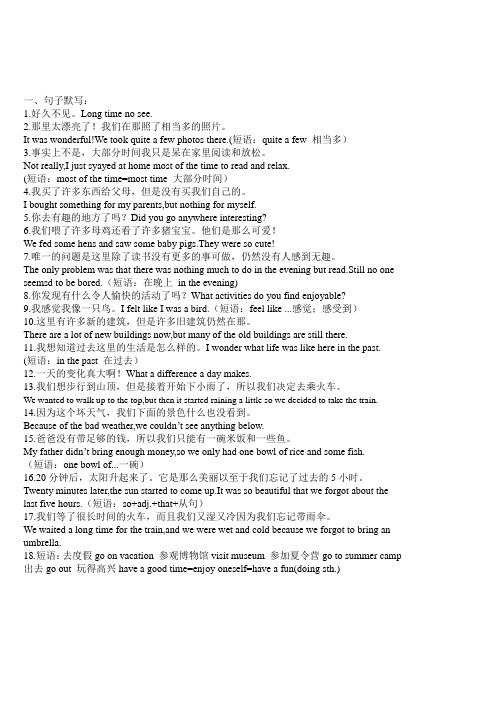
一、句子默写:1.好久不见。
Long time no see.2.那里太漂亮了!我们在那照了相当多的照片。
It was wonderful!We took quite a few photos there.(短语:quite a few 相当多)3.事实上不是,大部分时间我只是呆在家里阅读和放松。
Not really,I just syayed at home most of the time to read and relax.(短语:most of the time=most time 大部分时间)4.我买了许多东西给父母,但是没有买我们自己的。
I bought something for my parents,but nothing for myself.5.你去有趣的地方了吗?Did you go anywhere interesting?6.我们喂了许多母鸡还看了许多猪宝宝。
他们是那么可爱!We fed some hens and saw some baby pigs.They were so cute!7.唯一的问题是这里除了读书没有更多的事可做,仍然没有人感到无趣。
The only problem was that there was nothing much to do in the evening but read.Still no one seemsd to be bored.(短语:在晚上in the evening)8.你发现有什么令人愉快的活动了吗?What activities do you find enjoyable?9.我感觉我像一只鸟。
I felt like I was a bird.(短语:feel like ...感觉;感受到)10.这里有许多新的建筑,但是许多旧建筑仍然在那。
There are a lot of new buildings now,but many of the old buildings are still there.11.我想知道过去这里的生活是怎么样的。
人教版八年级上册英语Unit 1 知识点语法归纳总结
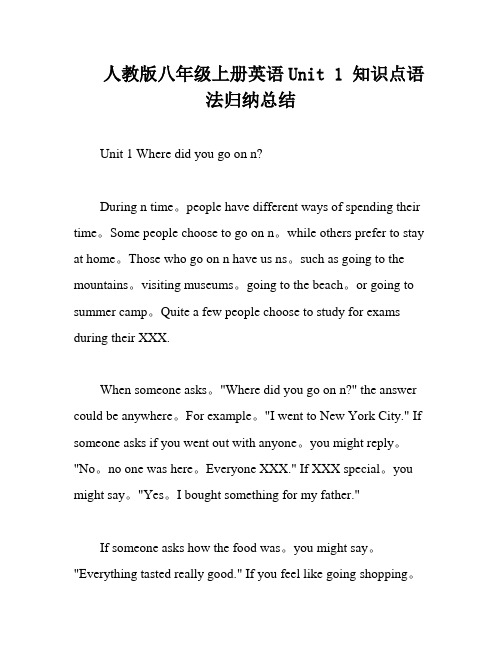
人教版八年级上册英语Unit 1 知识点语法归纳总结Unit 1 Where did you go on n?During n time。
people have different ways of spending their time。
Some people choose to go on n。
while others prefer to stay at home。
Those who go on n have us ns。
such as going to the mountains。
visiting museums。
going to the beach。
or going to summer camp。
Quite a few people choose to study for exams during their XXX.When someone asks。
"Where did you go on n?" the answer could be anywhere。
For example。
"I went to New York City." If someone asks if you went out with anyone。
you might reply。
"No。
no one was here。
Everyone XXX." If XXX special。
you might say。
"Yes。
I bought something for my father."If someone asks how the food was。
you might say。
"Everything tasted really good." If you feel like going shopping。
you might say。
人教版英语八年级上册第一单元知识点总结

Unit11. 疑问词how的用法(1)用什么手段,方法/交通工具How did he do it? / I don’t know how to swim.How do you come to school?(2)情况如何(指身体健康状况)How are you?(3) how many,how much表示“多少"how many后接可数名词复数,how much接不可数名词。
(4)how often是对动作发生的“次数"提问,询问的是频率“多久一次”(5)How old。
.?询问年龄How old are you?I am five.(6) How about…? ……如何?……怎么样?How about going to the movies?2. time表示不可数名词,意为“时间”。
What time is it?表示可数名词,意为“次数,倍数"—-—-————注意“次数"的表达方法一次 once,两次 twice,三次或三次以上用基数词加上times:three times、five times、one hundred times.表示“……几次”的表达方法是:once a day/ a week/ a month/ a year twice a day/ a week/ a month/ a year 3.How often do you shop?/How often do you exercise?--—-————exercise v/n shop v/ n1)He often exercises on weekends. We often do / take exercise(做运动)on weekends。
2)We often shop on weekends。
There are many shops in the neighborhood.4. As for homework,most students do homework every day。
人教版八年级英语上册语法点总结(最全面)

八年级上册语法点总结Unit 1 How often do you exercise?Grammar: 特殊疑问句:wh—questions:what, who,where, when, which,whose,why,whom等.特殊疑问句的构成及用法:1.结构:特殊疑问词+ 一般疑问句, 即:特殊疑问词+be/助动词/情态动词+主语+谓语/表语(+其他)疑问代词:1)Who:谁。
做主语,用来指人Who is the boy under the tree?2)Whom 谁,做宾语,用来指人Whom are you writing to?3) Whose 谁的,用来指所属关系,如果做定语,一般后接名词Whose pen is this?4)Which 哪个,哪些,用来指对人或物在一定范围之内进行选择Which grils will in the sports meeting? Which pen is Lily’s?5)What什么,通常指物,也可指人,一般用在没有指出范围的情况下What can you see in the picture?What are you doing now?疑问副词:1)When:何时,询问时间When will she come back?2)Where何地,询问地点, Where do you come from?3)Why为什么,询问原因, Why are you late for school?4)How 如何,询问手段、方式、工具以及程度等How do you usually go to school?5)How old多大,询问年龄,How old is Jim’s little brother?6)How many/much多少,询问数量How many birds are there in the tree?7)How far多远,询问距离,How far is it form your home to school?8)How long多长,多久,询问时间的长度或距离How long will you stay in Beijing?9)How often多长时间按一次,询问频率How often do you go to see your grandparents?10)How soon多久,询问时间How soon will you come back?频率副词:表示动作发生的频率,never, sometimes,often, usually, always.Unit 2 What's the matter with you?Grammar:1. 用have 来描述身体不适have/have got a +疾病名字;得了……病2.情态动词should,情态动词should,can, may, must没有人称和时态的变化,后接动词原形Unit 3 What are you doing for vacation?Grammar:现在进行时表将来一般将来时表示将要做某事或计划打算做某事要用到句型“be+doing”其中be是助动词,它有人称和单复数的变化。
新人教版八年级上册英语单元语法及知识点归纳汇总

新人教版八年级上册英语单元语法及知识点归纳Unit1 Where did you go on vacation?【重点语法】不定代词:不指名代替任何特定名词或形容词的代词叫做不定代词。
用法注意:1. some 和any +可数名/不可数名。
some 多用于肯定句,any多用于否定句、疑问句和条件从句。
有些问句中用some,不用any, 问话者希望得到对方肯定回答。
2. 由some, any, no, every 与body, one, thing构成的复合不定代词作主语时,其谓语动词用三单。
3. 不定代词若有定语修饰,该定语要置于其后:如:something interesting【重点短语】1. buy sth for ab./ buy sb. sth 为某人买某物2. taste + adj. 尝起来……3. nothing...but + V.(原形) 除了……之外什么都没有4. seem + (to be) + adj 看起来5. arrive in + 大地方/ arrive at + 小地方到达某地6. decide to do sth. 决定做某事7. try doing sth. 尝试做某事/ try to do sth. 尽力做某事8. enjoy doing sth. 喜欢做某事9. want to do sth. 想去做某事10. start doing sth. 开始做某事=begin doing sth.11. stop doing sth. 停止做某事区分:stop to do sth. 停下来去做某事12. dislike doing sth. 不喜欢做某事14. so + adj + that + 从句如此……以至于……16. tell sb. (not) to do sth. 告诉某人(不要)做某事17. keep doing sth. 继续做某事18. forget to do sth. 忘记去做某事/ forget doing sth 忘记做过某事【词语辨析】1. take a photo/ take photos 拍照quite a few+名词复数“许多…”2. seem + 形容词看起来…... You seem happy today.seem + to do sth. 似乎/好像做某事I seem to have a coldIt seems + 从句似乎..…. It seems that no one believe you.seem like ... 好像,似乎….. It seems like a good idea.3. arrive in +大地点= get to= reach+地点名“到达......”arrive at +小地点(注:若后跟地点副词here/there/home, 介词需省略,如:arrive here; get home)4. feel like sth 感觉像…feel doing sth. 想要做某事5. wonder(想知道)+疑问词(who, what, why)引导的从句。
- 1、下载文档前请自行甄别文档内容的完整性,平台不提供额外的编辑、内容补充、找答案等附加服务。
- 2、"仅部分预览"的文档,不可在线预览部分如存在完整性等问题,可反馈申请退款(可完整预览的文档不适用该条件!)。
- 3、如文档侵犯您的权益,请联系客服反馈,我们会尽快为您处理(人工客服工作时间:9:00-18:30)。
人教版八年级英语上册第一单元语法知识点归纳HEN system office room 【HEN16H-HENS2AHENS8Q8-HENH1688】Unit 1一、词组、短语:1、go on vacation去度假,2、stay at home 呆在家,3、go to the mountains 上山/进山,4、go to the beach到海边去,5、visit museums 参观博物馆,6、go to summer camp 去夏令营,7、quite a few 相当多,8、study for为……学习,9、go out 出去,10、most of the time大部分时间/绝大多数时间,11、taste good 尝起来味道好,12、have a good time玩的开心,13、of course当然可以,14、feel like感觉像……/想要,15、go shopping购物,16、in the past 在过去,17、walk around绕……走,18、too many 太多(可数名词前面),19、because of 因为,20、one bowl of 一碗……,21、find out 查出来/发现,22、go on继续,23、take photos 照相,24、something important重要的事情,25、up and down上上下下,26、come up出来二、习惯用法、搭配1. buy sth. for ab./ buy sb. sth. 为某人买某物2. taste + adj. 尝起来……3. nothing ….but + V.(原形) 除了……之外什么都没有4. seem + (to be) + adj 看起来5. arrive in + 大地方 / arrive at + 小地方到达某地6. decide to do sth. 决定做某事7. try doing sth. 尝试做某事 / try to do sth. 尽力做某事8. enjoy doing sth. 喜欢做某事9. want to do sth. 想去做某事10. start doing sth. 开始做某事11. stop doing sth. 停止做某事12. look + adj 看起来13. dislike doing sth. 不喜欢做某事14. Why not do sth. 为什么不做…….呢?15. so + adj + that + 从句如此……以至于……16. tell sb. (not) to do sth. 告诉某人(不要)做某事17. keep doing sth. 继续做某事18. forget to do sth. 忘记去做某事 / forget doing sth 忘记做过某事三、重点句子1. Where did you go on vacation? 你去哪儿度假的?1)这是一个由疑问副词where引导的特殊疑问句。
Where用来询问地点或场所,用于句首,其后跟一般疑问句。
如:Where are you from? Where does he live?2)go on vacation“去度假”He will go on vacation with his family. 他要和家人一起度假。
【解析】 vacation [v?'ke??n] n 假期 = holidayon vacation 在度假 take a vacation 去度假 winter vacation 寒假summer vacation 暑假①I have a lot of _______________every year . (vacation)( ) ②— Where did Sarah go on vacation? — She went to America.A.on vacationB. take a vacationC. is on vacationD. is for vacation2、Did you go with anyone?你和别人一起去的吗?这是一个一般过去时的一般疑问句。
当含有实义动词的一般过去时的陈述句变为一般疑问句时,需借助助动词did,此时后面的实义动词应用原形。
其句型结构为“did+主语+动词原形+其它?”,肯定回答为“Yes,主语+did”,否定回答为“No,主语+didn′t”·基本用法pron. anyone 任何人,相当于anybody,通常用在否定句、疑问句或条件从句中。
如: I won?t tell anyone I saw you here. 我不会告诉任何人我在这儿见过你。
Why would anyone want that job? 为什么会有人想要那份工作呢?知识拓展---同类词Some - any- no- every-指人 someone 有人 anyone 任何人 anybody no one 没有人nobody everyone 人人 everybody指物 something 某物 anything 任何事 nothing 没有事everything 一切事指地点 somewhere 某地 anywhere 任何地方 nowhere 无处,没有地方everywhere 到处注意:(1)由some-, any-, no-, every-构成的符合不定代词作主语时,都作单数看待,其谓语动词用第三人称单数形式。
(2)不定代词若有定语修饰,该定语要置于其后,作后置定语。
如:I?d like something to drink. 我想要些喝的。
Is there anything interesting in the book? 这本书中有有趣的东西吗?小结:【解析1】someone [s?mw?n] pron 某人anyone [eniw?n] pron 任何人everyone [evriw?n] pron 每人,人人my uncle 看望了我的叔叔visit是及物动词,意为“拜访;探望”,后接表示人的名词或代词。
visit还可以意为“参观;游览”,后接表示地点的名词。
a.I visited my grandmother last week. 上周我去______了我的外婆。
b. you want to visit Shanghai? 你想______上海吗?拓展:visitor意为“参观者;游客”。
These visitors come fromanything special 买特别的东西。
(P2)1)buy及物动词,意为“买;购买”。
其过去式为______。
拓展:buy sth. for sb.=buy sb. sth. 意为“给某人买某物”。
My uncle_____ _____a bike.= My uncle_____ _____for me.2)anything不定代词,意为“某事;某件东西”,主要用于疑问句或否定句中。
a.Do you want to buy anything for me? can?t say anything about it.3)anthing special表示“特别的东西”,形容词修饰不定代词时后置。
Is there________ ________in this book?这本书里有新的内容吗?, did you go anywhere interesting?哦,你去有趣的地方了吗?(P2)1)本句是did开头的一般疑问句2)anywhere用作副词,意为“在任何地方”。
eg:Did you go anywhere during the summer vacation?辨析:anywhere与somewhereanywhere意为“在任何地方”,常用于否定句和疑问句中。
eg:I can?t find it anywhere.somewhere意为“在某处;到某处”,常用于肯定句中。
eg:I lost my key somewhere near here.took quite a few photos there.我们在那里拍了不少照片。
(P2)take photos 意为“照相;拍照”。
eg:We______ ______on the Great Wall.我们在长城上照了相。
辨析:quite a few与quite a littlequite a few 意为“很多;不少”,修饰可数名词复数;quite a little 意为“很多;不少”,修饰不可数名词。
a. He stays here for _____ _____ _____days.is _____ _____ _____water in the bottle(瓶子).6. I just stayed at home most of the time to read and relax. 我大部分时间只是待在家里读书休息。
(P2)most of the time意为“大部分时间”,其中most为代词,意为“大部分;大多数”拓展most of…意为“……中的大多数”,它作主语时,谓语动词取决于most of 后所修饰的名词。
of us_____(be)going to the park. 我们大多数人要去公园。
b. Most of the food_____(go)bad. 大部分的食物都变质了。
7.Everything tasted really good!所有的东西尝起来真的很好吃!(P3)taste在此为系动词,意为“尝起来”,其后接形容词构成系表结构。
a.The food tastes really great.食物尝起来棒极了。
8. Did everyone have a good time?大家都玩得很开心吗?(P3)have a good time = enjoy oneself = have fun 玩得开心(+ doing)eg: We had a good time visiting the the Great Wall. = We enjoyed ourselves visiting the the Great Wall.= We had fun visiting the the Great Wall.did you like it? 你觉得它怎么样?(P3)How do/did you like……? 意为“你觉得……怎么样?”,用来询问对方的观点或看法,相当What do you think of……?eg: How do you like your new job? = _____ _____ _____ _____ your new job? you go shopping? 你们去购物了吗?(P3)go shopping意为“去购物;去买东西”,同义短语为do some shopping.eg: I usually go shopping on Sundays.我通常星期天去购物。
